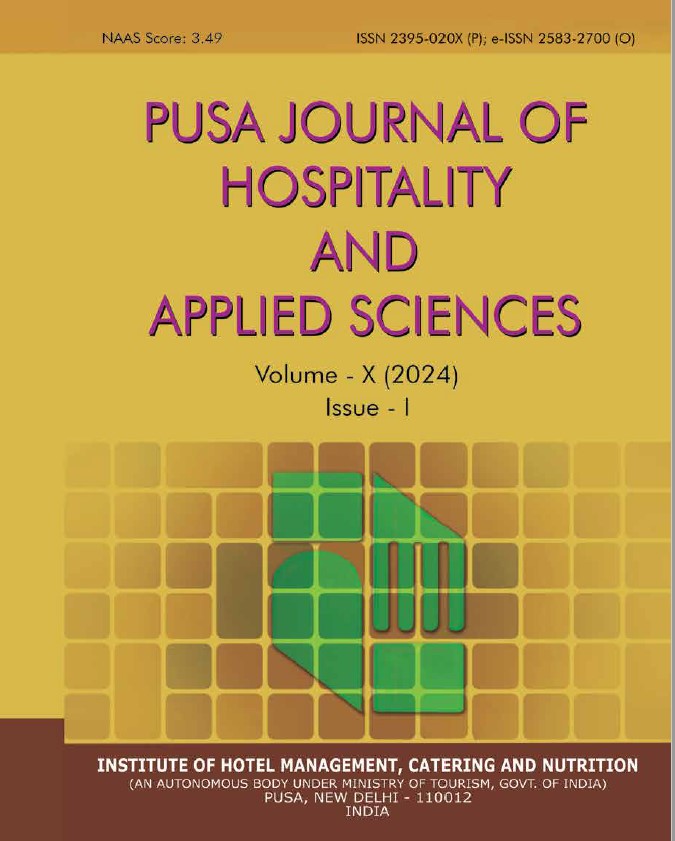Causal Factors Of Consumer Loyalty To Online Food Delivery Services Of Delhi
DOI:
https://doi.org/10.48165/pjhas.2023.9.2.2Keywords:
Online Food Delivery, Consumer Loyalty, Customer Satisfaction, Competitive Pricing, Customer ServiceAbstract
Background: The internet-based cuisine transportation industry observed noteworthy expansion, transforming the approach individuals requested and obtained their repasts. This metamorphosis was propelled by elements such as the ubiquitous utilization of portable gadgets and the escalating need for expediency in everyday existence. Internet-based food delivery services gained popularity in Delhi, offering a wide range of culinary options and timely delivery to meet the needs of customers. Objective: This investigation endeavored to scrutinize the elements that impacted patron allegiance to web-based cuisine transportation amenities in Delhi and assessed the correlation between client gratification and faithfulness. Methodology: This study employed hybrid research methodology, gathering qualitative data through a structured questionnaire (n=50) in the NCR Delhi and secondary data from sources like trade publications, scholarly journals, and online repositories. Elements Analyzed: Ease of use, Food options quality, Consumer engagement, Delivery efficiency, Economical pricing, Client support. The quantitative data was analyzed using survey response metrics and descriptive statistics (mean, median, mode, standard deviation). The analysis involves descriptive examination of survey responses and correlation analysis for associations. Results: Ease of use: 4.5/5 (Average), Food quality: 85% above satisfactory, Consumer engagement: 70% high, Delivery efficiency: 90% prompt, Pricing: 60% reasonable, Client support: 80% helpful. The scrutiny furnished perceptions into the factors that influenced customer allegiance and the correlation amid ease, cost competitiveness, patron contentment, and allegiance. The outcomes were exhibited employing statistical metrics, association coefficients, and significance levels. Conclusion: The exploration aided in comprehending the elements that impacted patron fidelity to web-based cuisine conveyance amenities in Delhi. It emphasized the significance of ease, patron contentment, consumer involvement, punctual dispatch, rivalrous cost, and efficient patron maintenance in cultivating allegiance.
References
Chen, Y., & Xie, F. T. (2018). Online food delivery: Factors influencing satisfaction and loyalty. International Journal of Contemporary Hospitality Management, 30(1), 280- 298.
Chiang, K. P., Yang, S. C., & Lin, Y. H. (2019). Antecedents and consequences of convenience in online food delivery services: An empirical study. International Journal of Hospitality Management, 78, 10-19.
Choi, H., Kim, Y., & Lee, H. G. (2020). Exploring the factors influencing consumers’ choice of online food delivery apps in South Korea. Sustainability, 12(6), 2345.
De Matos, C. A., & Rossi, C. A. V. (2008). Word-of-mouth communications in marketing: A meta-analytic review of the antecedents and moderators. Journal of the Academy of Marketing Science, 36(4), 578-596.
Dholakia, U. M., Singh, S., & Zhong, W. (2020). Customer satisfaction, trust, and loyalty in sharing economy services: An empirical investigation. Journal of the Academy of Marketing Science, 48(3), 450-470.
Fornell, C., & Larcker, D. F. (1981). Evaluating structural equation models with unobservable variables and measurement error. Journal of marketing research, 18(1), 39-50.
Gupta, R., Grewal, R., & Klassen, R. D. (2004). The impact of technology on the quality-performance-loyalty chain: A research agenda. Journal of the Academy of Marketing Science, 32(4), 365-381.
Hair, J. F., Black, W. C., Babin, B. J., & Anderson, R. E. (2014). Multivariate data analysis (7th ed.). Pearson Education Limited.
; 9(2) : 11-17
Kim, W. G., & Cha, Y. (2002). Antecedents and consequences of relationship quality in hotel industry. Journal of Hospitality & Tourism Research, 26(3), 274-297.
Kumar, V., Pozza, I. D., & Ganesh, J. (2013). Revisiting the satisfaction–loyalty relationship: Empirical generalizations and directions for future research. Journal of Retailing, 89(3), 246-262.
Liao, S. H., & Cheung, M. T. (2001). Internet-based e-shopping and consumer attitudes: An empirical study. Information & Management, 39(9), 837-846.
Liu, S., & Li, H. (2019). Understanding the determinants of online food delivery service customer satisfaction and loyalty: An integration of fairness theory and expectation-confirmation theory. International Journal of Hospitality Management, 82, 232-243.
Lu, X., Bai, B., & Chang, J. (2018). Understanding the antecedents and consequences of online food delivery satisfaction: A proposed model. Journal of Hospitality Marketing & Management, 27(7), 736-759.
Lu, X., Yang, Z., Chang, J., & Wong, C. (2016). Understanding the factors affecting online food ordering behaviors: A comparison between college students and working adults. Journal of Hospitality Marketing & Management, 25(8), 934-956.
Nusair, K., & Bilgihan, A. (2019). Determinants of customer loyalty in the hotel industry: An empirical study. Journal of Quality Assurance in Hospitality & Tourism, 20(2), 169-191.
Oliver, R. L. (1997). Satisfaction: A behavioral perspective on the consumer. McGraw-Hill.
Parasuraman, A., Zeithaml, V. A., & Berry, L. L. (1988). SERVQUAL: A multiple-item scale for measuring consumer perceptions of service quality. Journal of Retailing, 64(1), 12-40.
Suhartanto, D., Juliana, A., & Fakhruddin, H. F. (2019). Exploring the determinants of customer loyalty in online food delivery service. International Journal of Emerging Markets, 14(1), 37-55.
Yu, J., Chuang, Y. C., & Liao, H. (2012). Prevalence of disconfirmation: A meta-analysis. Journal of Service Research, 15(1), 84-97.
Zeithaml, V. A. (1988). Consumer perceptions of price, quality, and value: A means-end model and synthesis of evidence. The Journal of Marketing, 52(3), 2-22.




